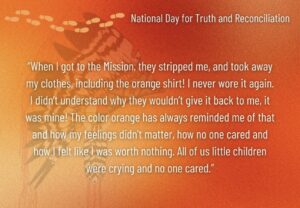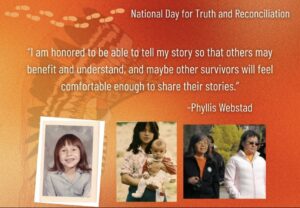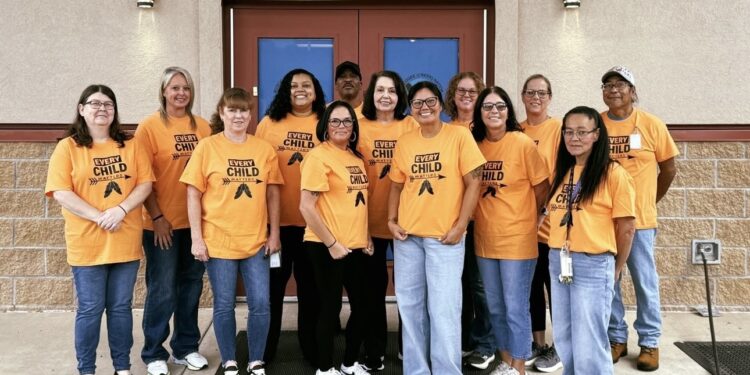“We still have people, we still have Mvskoke people out there that still speak the Mvskoke language fluently and so in their efforts to try to kill us, basically to kill everything that we wanted but they didn’t succeed because our language is still going, our culture is still going, our grounds are still going and our songs are still sung.” – Galen Cloud
MVSKOKE RESERVATION- On September 30, employees from departments across the Muscogee (Creek) Nation wore orange for Orange Shirt Day-Every Child Matters. This day is also known as National Day for Truth and Reconciliation or National Day of Remembrance and is an annual observance held throughout the United States and Canada to remember and reflect on the experiences of Indigenous children at residential schools. Many survivors remembered and carried on their stories, while others never made it back home.
About Orange Shirt Day
Back in 1973 Phyllis (Jack) Webstad was a young Indigenous girl living on the Dog Creek reservation; she was six years old at the time. She lived with her grandmother who paid for an orange shirt that Phyllis picked out to wear on her first day of school. However, when she went to the residential school the shirt was taken away from her.
Residential schools put young Indigenous children through a variety of domestic, sexual and emotional trauma. These schools were meant to take away their true identity.
According to Indigenous right’s advocacy group Cultural Survival, the day is one for open discussions on the reality of history, “Orange Shirt Day initiated, and continues to allow for, conversations about residential schools on an international scale, and allows for meaningful discussions of the impacts and legacies of residential schools.”
Residential schools in Canada and in the U.S. were for Indigenous children, this was to take away everything that was anything tied to their culture and how they grew up in their own ways. The term, “Kill the Indian, Save the man” came from this time period to describe the assimilation process which tried to destroy anything that distinguished Tribal people- changing the children’s clothing, cutting their hair, changing their tribal name, prohibiting students from speaking their language. Anything that represented their true, Indigenous identity was taken away.

According to the Cultural Survival source, “from the 1880s, upwards of 150,000 Indigenous children went to over 130 residential schools across Canada, the last of which closed in 1996. It is estimated that between four and six thousand children died at these residential schools. Between 1819 and 1969, the U.S. operated or supported 408 boarding schools. At the time of a 1969 report, 34,605 children were enrolled in Bureau of Indian Affairs (BIA) boarding schools and 15,450 enrolled in BIA day schools. Since its start in June 2021, the Federal Indian Boarding School initiative has identified marked or unmarked burial sites at approximately 53 of these schools.”
MCN statements
Muscogee (Creek) Nation National Council Representative Galen Cloud spoke to Mvskoke Media about Orange Shirt Day. Last year, Cloud recalled, the MCNNC wore orange in support of the day and boarding school survivors were honored during the council session. They spoke about the history of “why orange” and went back to the origin story.
“It’s important, it’s just like with all of the tribes and along with the Muscogee Nation, it’s a sad story. It’s a story that should be told that everybody should know about the boarding schools just as our forced removal. That’s a dark thing in history that happened, but it happened to us,” Cloud said.
Cloud spoke about the inhumane treatment experienced by students and viewed it as rounding children up like cattle, like animals.
“That’s a dark history and I think people need to realize that happened to us. It wasn’t a school that they wanted to send their kids to, that was something that they rounded them up and forced them to go.”
Cloud was emotional while speaking and thinking about all of the horrible things done to young Indigenous children.
“That’s what they were trying to do to us, not just us but to all the other tribes because in their mind the ‘Indians were the problem’ and they were trying to get rid of our language, our culture ways, and they couldn’t practice that, they couldn’t do that,” Cloud said.
“Then the language; now that survivors of those, like the kids you’ll hear a lot of stories of them saying ‘I wish I would have learned the language’, ‘I wish my mom and dad would have taught me’, but during the boarding schools that’s were they lost because they were mistreated, they were beaten for speaking their language.”
Cloud sees that this history is becoming recognized on a national level through news and social media outlets. He also reflected on survivor stories. “It’s getting out there more and more, that’s something people don’t want to hear but they have to hear it because it is history, it’s a dark history but it is history and it’s sad that it is part of ours,” Cloud said.
Employees in departments across the MCN observed the day, posting support to social media. MCN Education and Training, Head Start, and the Reintegration Program wore orange and shared statements in remembrance and solidarity. MCN DET wrote, “We stand together to remember and honor the children impacted by residential and boarding schools, and to reaffirm our commitment to education, healing and cultural preservation.”
The MCN DETraining wrote out a statement on their page on behalf of the MCN Reintegration Program staff, “As a department, we honor the children affected by residential and boarding schools and stand united in support of healing, education and cultural preservation.”






